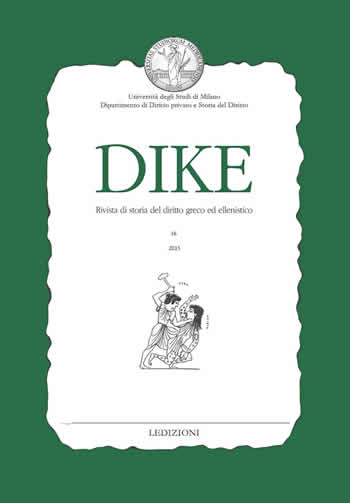THE STATUTE ON HOMOLOGEIN IN HYPERIDES’ SPEECH AGAINST ATHENOGENES
DOI:
https://doi.org/10.13130/1128-8221/4289Abstract
The paper focuses on the structure of contract in Athenian law and the liability to comply with. After a short outline of the meaning and the practical relevance of ‘consensual contracts’ in classical Roman law and their further development in late Antiquity up to modern times the one-century-old controversy about contract in ancient Greek law is resumed: on the one hand the ‘consensualists’ hold that the verb homologein (literally “speak the same”) means “promise to comply with debts.” On the other hand the ‘realists’ argue that the binding force of a contract was not created by a simple promise, but rather through a real basis. The debtor was only liable when he had accepted some goods or assets from the creditor and was frustrating the purpose, for which the creditor had rendered them to him, the so-called ‘Zweckverfügung’ (disposition for a certain purpose, Hans Julius Wolff). One of the crucial sources is the nomos on homologein quoted in Hyperides’ speech Against Athenogenes (§ 13). Compared with quotations of similar statutes (Dem. 42.12, 56.2) it will turn out that in technical sense homologein was only related to court procedure: “in whatever regard someone says the same as another, this is definitive (in the law court)” and did not create obligations.Downloads
I dati di download non sono ancora disponibili.
Dowloads
Come citare
Thür, G. (2014). THE STATUTE ON HOMOLOGEIN IN HYPERIDES’ SPEECH AGAINST ATHENOGENES. Dike - Rivista Di Storia Del Diritto Greco Ed Ellenistico, 16, 1–10. https://doi.org/10.13130/1128-8221/4289
Fascicolo
Sezione
Articoli
Licenza
- Gli autori mantengono i diritti sulla loro opera e cedono alla rivista il diritto di prima pubblicazione dell'opera, contemporaneamente licenziata sotto una Licenza Creative Commons - Attribuzione - Condividi allo stesso modo che permette ad altri di condividere l'opera indicando la paternità intellettuale e la prima pubblicazione su questa rivista.
- Gli autori possono aderire ad altri accordi di licenza non esclusiva per la distribuzione della versione dell'opera pubblicata (es. depositarla in un archivio istituzionale o pubblicarla in una monografia), a patto di indicare che la prima pubblicazione è avvenuta su questa rivista.
- Gli autori possono diffondere la loro opera online (es. in repository istituzionali o nel loro sito web) prima e durante il processo di submission, poichè può portare a scambi produttivi e aumentare le citazioni dell'opera pubblicata (Vedi The Effect of Open Access).





